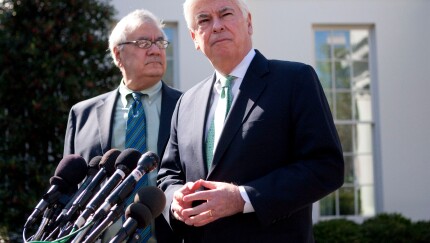The Senate regulatory relief bill isn’t exactly one in a million, but it sure feels that way in Washington.
The current legislation represents the best chance bankers have had since the passage of the Dodd-Frank Act to meaningfully alter the law, with Republicans now controlling Congress and the White House. Lawmakers are slated to begin debating the bill today.
Observers predict that there’s a decent chance the legislation, sponsored by Banking Committee Chairman Sen. Mike Crapo, R-Idaho, will ultimately be enacted, but it’s shaping up to be a battle to the end.
There's been a legislative bottleneck since the the crisis-era law went into effect, but Congress has moved forward on a handful of significant changes.
Supporters and detractors of the bill are now out in full force — to the point that it can be difficult to discern, based on public messaging alone, what the package would even do.
Are you having déjà vu yet? The
#BankLobbyistAct doesn’t benefit anyone besides the big banks. It’s time for the rest of us to fight back and demand that Washington work for us, not the big bank lobbyists.https://t.co/ds2ryUBdhn — Elizabeth Warren (@SenWarren)
March 2, 2018
.
@ICBA 's@Cam_Fine : If you're against S. 2155, you're against community banks and the communities they support.https://t.co/DixzEDkSH4 — Camden Fine (@Cam_Fine)
March 1, 2018
Why do the stakes feel so high? For Republicans and moderate Democrats looking to notch a win for their small-bank constituents, it’s now or never.
“All indications are that the Crapo bill is the only train leaving the station legislatively for some time,” said Isaac Boltansky, director of policy research at Compass Point Research & Trading.
The bill is one of roughly 3,000 financial measures that have been introduced since summer 2010 (including some duplicates introduced anew each session). While more than 100 financial laws have been passed in that time, the vast majority have amounted to chump change for bankers, according to a review of legislative data on Congress.gov and committee reports. (To wit: One third of those laws deal with commemorative coins and congressional gold medals.)
Congress has approved just a handful of meaningful banking provisions over the past eight years, including even fewer changes to Dodd-Frank, despite the fact that the law has been a central focus for the banking committees in every legislative session since its passage. The tally includes two controversial, party-line rule repeals under the Congressional Review Act, which occurred last year under President Trump, and arguably no measures that would meaningfully strengthen the law or consumer protections.
Yet while the majority of provisions in the current legislation
For years, the crisis-era law has remained largely untouchable, despite repeated efforts from the banking industry and congressional Republicans to put the law back in play.
“Touching Dodd-Frank has become synonymous with watering down Dodd-Frank,” said Dan Crowley, a partner at K&L Gates. “As long as that political framework is in place, it’s been very difficult to move legislation, even when there’s broad bipartisan agreement that there are problems and unintended consequences.”
Leading Republicans have long made clear their disdain for the law, putting Democrats on guard against any changes that could be used as a Trojan horse for more sweeping reforms. The partisan dynamic — which of course models the problems facing Congress more broadly — has created an untenable situation. The law is more than just a set of mandates, it’s a litmus test for those who work on banking — whether you worry about Wall Street’s influence on politics and society or a runaway regulatory system hindering economic growth.
Former Rep. Barney Frank, one of the law’s namesakes, has argued that the strategy of stonewalling any changes has come at a price, because it foreclosed on earlier opportunities for Democrats to make modest tweaks to the law before Republicans won the Senate in November 2014.
“In my view, we would have been much better off if the strongest Democratic supporters of reform united behind [a bill], offering their colleagues from tougher districts the chance to demonstrate to their community bankers their support for their legitimate concerns,” he
But the intractability has deeper consequences than a somewhat more adverse reform bill than Democrats might have otherwise been able to garner.
Instead of focusing on the problems of tomorrow — heightened scrutiny of cryptocurrency or improved anti-money laundering standards for the digital age — Congress remains trapped in a fight over the last crisis and the response to it. So much so that lawmakers have failed to make tangible progress toward resolving the other big question mark coming out of 2008 — what to do with Fannie Mae and Freddie Mac.
The brewing war over the Senate banking bill is unlikely to open a door for sober discussions on some of these other looming issues in the near future. Let’s hope it doesn’t take another crisis to break the Dodd-Frank spell.






